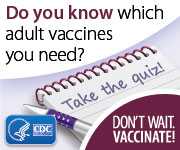Why Vaccines are Important for You
In the U.S., vaccines have greatly reduced or eliminated many infectious diseases that once routinely killed or harmed infants, children, and adults. However, the viruses and bacteria that cause these diseases still exist and you can still get these diseases if you aren’t vaccinated.
You May Be at Risk for Serious Disease
Every year thousands of adults in the U.S. become seriously ill and are hospitalized because of diseases that vaccines can help prevent. Many adults even die from these diseases. By getting vaccinated, you can help protect yourself from much of this unnecessary suffering.
Even if you received the vaccines you needed as a child, the protection from some vaccines can wear off. You may also be at risk for other diseases due to your job, lifestyle, travel, or health conditions. Find out what vaccines you may need based on different risk factors.
You Can Protect Yourself and Your Loved Ones from Disease
Vaccines Are Very Safe
- Vaccines are tested and monitored. Vaccines go through years of testing before the Food and Drug Administration (FDA) licenses them for use. Both the CDC and FDA continue to track the safety of all licensed vaccines.
- Vaccine side effects are usually mild and go away in a few days. The most common side effects include soreness, redness, or swelling where the shot was given. Severe side effects are very rare.
- Vaccines are one of the safest ways to protect your health. Talk with your doctor about the vaccines you should safely receive based on your health or other conditions.
Vaccines can lower your chance of getting certain diseases. Vaccines work with your body’s natural defenses to help you safely develop immunity to disease. This lowers your chances of getting certain diseases and suffering from their complications. For instance:
- Hepatitis B vaccine lowers your risk of liver cancer.
- HPV vaccine lowers your risk of cervical cancer.
- Flu vaccine lowers your risk of flu-related heart attacks or other flu-related complications from existing health conditions like diabetes and chronic lung disease.
Read more about how vaccines work [2 pages].
Vaccines lower your chance of spreading disease.
- Some people in your family or community may not be able to get certain vaccines due to their age or health condition. They rely on you to help prevent the spread of disease.
- Infants, older adults, and people with weakened immune systems (like those undergoing cancer treatment) are especially vulnerable to infectious disease. For example, newborn babies are too young to be vaccinated against whooping cough. Unfortunately, whooping cough can be very dangerous or even deadly for them. Pregnant women should get the Tdap vaccine during every pregnancy to help protect their babies from whooping cough. Anyone who is around babies should be up to date with their whooping cough vaccine.
You Can’t Afford to Get Sick
You have a busy life and too much responsibility to risk getting sick. Vaccines can help you stay healthy so you don’t miss work. If you can avoid getting sick, you will have more time for your family, friends and hobbies.
Getting recommended vaccines can give you some peace of mind. You will have the best possible protection available against a number of serious diseases.
- Page last reviewed: May 2, 2016
- Page last updated: May 2, 2016
- Content source:



 ShareCompartir
ShareCompartir